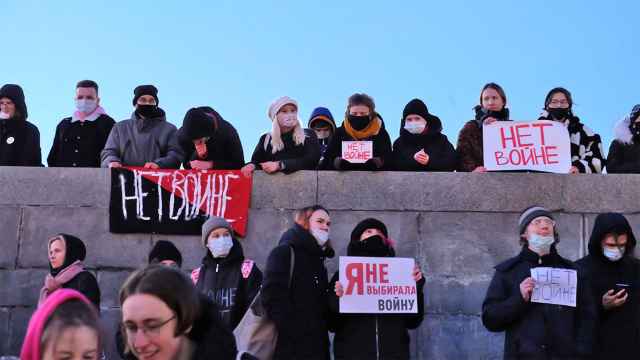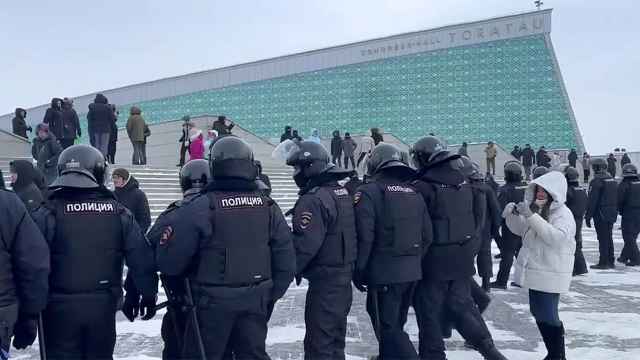For Russians, 2019 was a year of neither peace nor war, of neither outstanding cultural and sporting events nor impressive economic achievements.
It did not bring new reasons to be optimistic about the future, but did provide plenty of cause for alarm. And, even as the authorities regularly provide Russians with a variety of reasons to feel discontented, they responded to outbursts of indignation by tightening the screws even further. This legacy of 2019 might find expression in unpredictable form during the remaining years of President Vladimir Putin’s rule.
Government economists now consistently refer to “stability” in place of its less attractive synonym, “stagnation.” The Russian economy experienced only weak growth in 2019 and the task of exceeding the 3% global average in the near future looks almost impossible.
Even Putin admits that the launch of large-scale national projects has yet to produce a noticeable effect on either the economy or the lives of ordinary citizens. Real disposable incomes have stagnated for the last five years, contributing to Russians no longer viewing stability as a good thing, according to polls.
The Russian economy needs an influx of private investment, but that will not be forthcoming without real improvement in the investment climate, independent courts, and and end to the siloviki’s constant interference in business activity.
Putin has been talking for many years about the importance of reducing the pressure on businesspeople, but the conservative hardliners interpret his words in their own way. The Russian business community will remember 2019 for the criminal cases against investor Michael Calvey, as well as against Sergei Petrov and David Yakobashvili, the founders of Rolf and Wimm-Bill-Dann. And as the case against Valery Izrailit showed, the siloviki and courts did not even take presidential guarantees of protection seriously.
Against the backdrop of Moscow’s turbulent foreign policy activity of past years, 2019 was relatively calm, with the Kremlin putting its desire to demonstrate great power ambitions on hold. The election of the new Ukrainian president, Volodymyr Zelenskiy in April enabled Moscow and Kiev to take their first steps towards decreasing tensions, in particular, through a prisoner exchange.
After a personal meeting between the two leaders during the Normandy Format talks, Russia’s Gazprom and Ukraine’s Naftogaz agreed to settle their mutual claims and to a new contract for the transit of gas — meaning that no new gas war will undermine the progress in relations between the two countries.
One of the most important features of 2019 was the growing divide between society and the authorities. The ruling bureaucracy disregards the interests and opinions of the people even while blocking the channels for them to express their dissatisfaction, including by passing a growing body of repressive legislation.
This year saw the introduction of laws prohibiting citizens from using the Internet to slander the authorities, punishing people for fake news reports, and recognizing individuals — and not only organizations — as foreign agents.
In gubernatorial elections, the Kremlin managed to eliminate competition and avoid the defeat its handpicked candidates suffered last year. In elections for regional legislative assemblies, however, the United Russia party suffered significant setbacks. In Moscow, the decision to prevent independent candidates from running for office sparked mass rallies demanding fair elections. These actions demonstrated people’s ability to stage entirely peaceful protests in the face of police brutality.
The criminal case claiming that protestors had staged “mass riots” fell apart due to the lack of corpus delicti. Nevertheless, 11 people were sentenced to very real prison terms for such “crimes” as throwing a plastic cup in the direction of a police officer — once again proving that the Russian courts do the bidding of the authorities.
The excessive sentences and the unpunished abuses of the hardliners aroused an impressive degree of solidarity among both corporate and private interests — a factor that doubtless saved the defendants from even harsher sentences.
The authorities gave the people yet another opportunity to rally together — this time in defense of journalist Ivan Golunov, whom they accused of attempting to sell drugs in retaliation for his anti-corruption investigations. However, investigating wrongdoing by the siloviki is always extremely difficult.
Protests also broke out far beyond Moscow in 2019. Once again, the authorities triggered the problem, now with their plans for garbage reform. Protests against unfair garbage policies broke out in the Arkhangelsk and Moscow regions as well as the Komi and Tatarstan Republics in what effectively became political demonstrations on a large scale, at least by local standards. Protestors’ demands vary, but sociologists have noted that the people are increasingly calling for change, political freedoms and equality before the law.
The political situation will inevitably heat up as the 2021 parliamentary elections and the end of Putin’s current term approach.
Renewed efforts by those touting the prospects of Putinism and the renewed discussion about eliminating the Constitutional limit to two consecutive presidential terms will only mark the beginning of the jockeying for position after the transfer of power. The mounting degree of societal discontent against the backdrop of a lackluster economy is probably the main result of 2019 — and it could hardly please anyone.
A Russian version of this article was first published by Vedomosti.
A Message from The Moscow Times:
Dear readers,
We are facing unprecedented challenges. Russia's Prosecutor General's Office has designated The Moscow Times as an "undesirable" organization, criminalizing our work and putting our staff at risk of prosecution. This follows our earlier unjust labeling as a "foreign agent."
These actions are direct attempts to silence independent journalism in Russia. The authorities claim our work "discredits the decisions of the Russian leadership." We see things differently: we strive to provide accurate, unbiased reporting on Russia.
We, the journalists of The Moscow Times, refuse to be silenced. But to continue our work, we need your help.
Your support, no matter how small, makes a world of difference. If you can, please support us monthly starting from just $2. It's quick to set up, and every contribution makes a significant impact.
By supporting The Moscow Times, you're defending open, independent journalism in the face of repression. Thank you for standing with us.
Remind me later.








